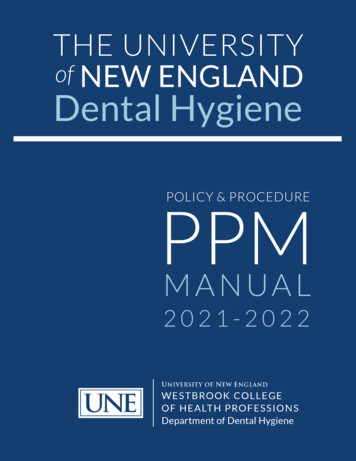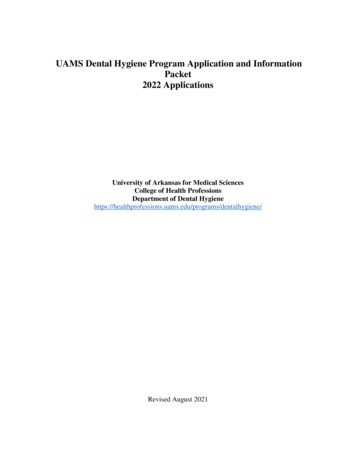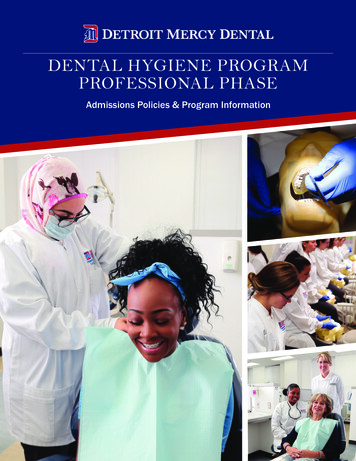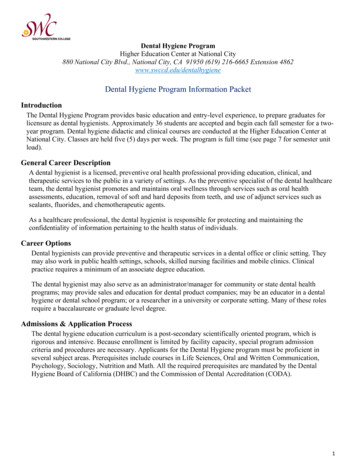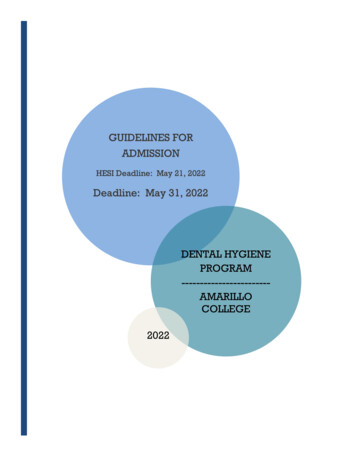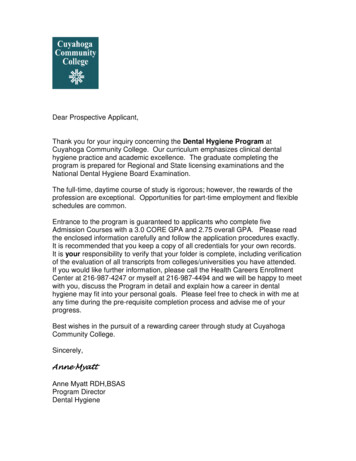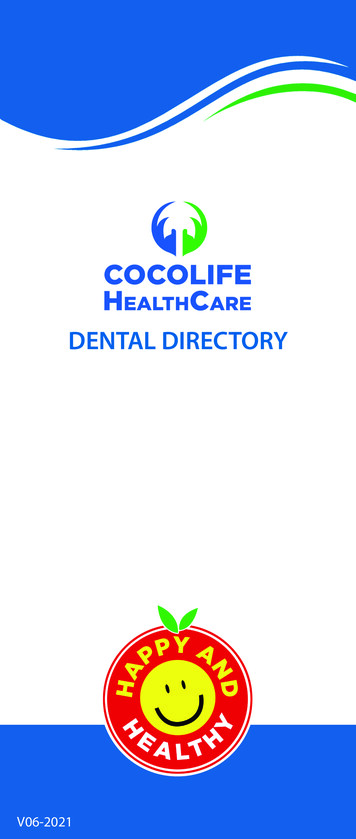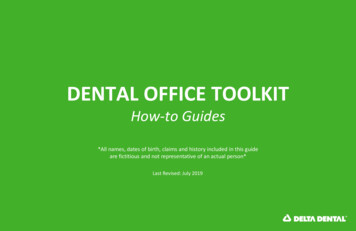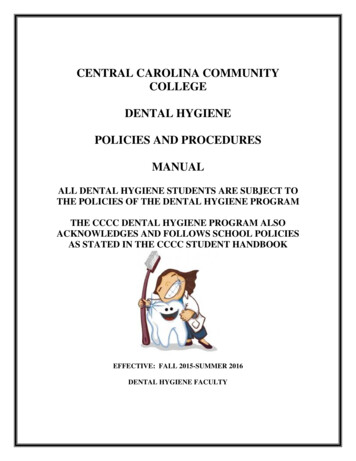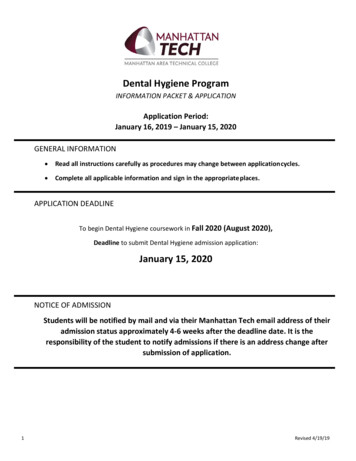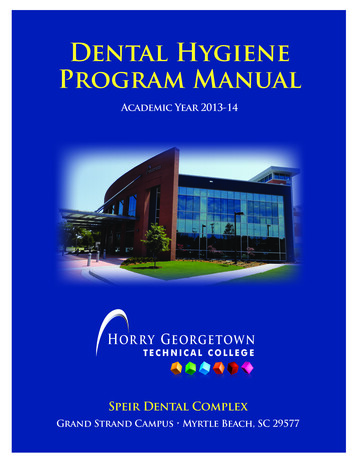
Transcription
Dental HygieneProgram ManualAcademic Year 2013-14Hor ry GeorgetownTECHNICAL COLLEGESpeir Dental ComplexGrand Strand Campus Myrtle Beach, SC 29577
HORRY-GEORGETOWN TECHNICAL COLLEGEDENTAL SCIENCES DEPARTMENTDENTAL HYGIENESTUDENT PROGRAM MANUALThis program manual has been designed to provide the student with informationregarding the Dental Hygiene Program. Further information regarding the Collegemay be found in the College catalog. All students must possess a copy of bothdocuments for reference during their academic stay at the College.2013-2014Page 1
TABLE OF CONTENTSPhilosophy, Goals & Competencies . .3ADHA Standards for Clinical Dental Hygiene Practice .7Professional Roles of the Dental Hygienist 14Division of Health Sciences . .15Accreditation Status & Complaint Process. . .16Program Facilities . 17Honors and Awards 18Administration and Full-Time Faculty .19Organizational Chart . .20About the Faculty . .22Requirements for Admission, Progression, Re-admission & Graduation . .26Essential Functions of a Dental Hygienist .31Dental Hygiene Curriculum . .33Courses Meeting the Humanities Requirement 34Expense Statement 35Textbook List . .37Financial Aid and Student Advising . 39Academic Policies . .40Attendance Policy . .43Clinical Dress Guidelines 45Student Responsibility . 48Academic Honesty .50Program Activities . 51Student Organization . .53Licensure Examinations . 54Tips for Success . 56College Support Services . .57Personal Items . 59Risks of a Dental Healthcare Professional . 61Information Sheet on Hepatitis B Vaccine . 62Statement of Understanding2013-2014 . 63Page 2
PROGRAM PHILOSOPHY AND GOALSPHILOSOPHYThe Horry Georgetown Technical College Dental Hygiene program believes that thedental hygienist is an extremely important member of the dental health team whomakes a significant contribution to the total health care of all people. Through theuse of state-of-the-art technology in lecture and clinical instruction, it is the missionof this program to provide the student with a well-rounded general education aswell as an evidenced-based professional education. In so doing, the student will beprepared for his/her role as a successful dental hygienist, as well as an enlightenedand contributing citizen to the community.It is the aim of the dental hygiene program faculty to create a supportiveenvironment in which the student will develop self-confidence, expertise in clinicalskills, and the desire to learn to become an effective, dedicated health care provider.Through the use of problem solving, planned experiences, goal setting, and selfassessment, the graduate is expected to become a purposeful, thinking, self-directedmember of the professional society able to make critical judgments in both personaland professional roles.PROGRAM GOALS & COMPETENCIES:The goals and competencies of the Horry Georgetown Technical College DentalHygiene Program are to provide the dental profession with a knowledgeable dentalhygienist who can assume responsibility for providing current dental hygieneservices within the scope of the South Carolina Dental Law. To achieve this purpose,the following are the stated program goals and competencies:GOAL 1.Graduates will be able to demonstrate fundamental knowledgein the Dental Hygiene curriculum components.Competencies:1.1Demonstrate working knowledge of the general education component of thecurriculum. Display effective interpersonal, written, and communication skillswith individuals and groups from diverse cultural populations. Demonstrate critical thinking skills. Demonstrate computer literacy.2013-2014Page 3
1.2Demonstrate a working knowledge of the biomedical sciences and theirrelationship to total body health.1.3Demonstrate essential knowledge of the dental sciences focusing on oralhealth and disease to effectively apply the dental hygiene process of care andprevention methodologies to all patients.GOAL 2.Graduates will be able to demonstrate competency in theclinical and interpersonal skills necessary for the provision ofcurrent comprehensive preventive, educational, and ethicaldental hygiene services within a diverse patient population.Competencies:2.1The student will demonstrate core values in ethics, skills, and knowledge inrelationship to the dental hygiene process of care (assessment, diagnosis,planning, implementation, and evaluation). 2.2Adhere to the American Dental Hygienists' Professional Code of Ethics.Adhere to all state and federal rules and regulations governing thepractice of dental hygiene.Utilize critical analysis and problem solving skills in the provision ofdental hygiene careAssessment: The student will methodically collect, analyze, and record dataon the general, oral, and psychosocial health status on a culturally diversepatient population. Obtain, review, and update a complete medical, family, social anddental historyRecognize health conditions and medications that impact overallpatient careIdentify patients at risk for a medical emergency and manage thepatient care in a manner that prevents an emergencyIdentify predisposing and etiologic risk factors for education,prevention, and intervention.2.3Diagnosis:Use critical decision making skills to synthesize patientassessment data in formulating a dental hygiene diagnosis.2.4Planning: Collaborate with the patient and other health professionals toformulate a comprehensive individualized dental hygiene care plan withalternative treatment modalities that is based on current scientific evidence.2013-2014Page 4
2.5Implementation: Provide dental hygiene treatment that includes preventiveand therapeutic services designed to achieve and maintain oral health byguiding the patient in setting and achieving oral health goals. 2.5Provide a high standard of care to all patients in a humane,empathetic, and caring mannerPerform dental hygiene treatment to eliminate and/or control localetiologic factors to prevent and control caries, periodontal disease andother oral conditionsControl pain and anxiety during treatment through the use ofaccepted clinical and behavioral techniquesProvide life support measures to manage medical emergencies shouldthey ariseRespect the goals, values, beliefs, and preferences of the patientthroughout treatmentEvaluation:Evaluate the effectiveness of the implemented clinical,preventive, and educational services and modify as needed. 2.6Establish a prioritized planned sequence of care (educational, clinical,and evaluation) based on the dental hygiene diagnosis; identified oralconditions; potential problems; etiologic and risk factors; and availabletreatment methods.Obtain medical consultation when appropriateMake referrals to other health care professionals as neededObtain the patient’s informed consent based on a thorough casepresentationAssess the outcomes of dental hygiene treatment utilizing variousindices, instruments, etc.Evaluate the patient’s satisfaction with the care that has beenreceived and the health status that has been achievedEstablish appropriate treatment or referrals based on evaluation dataDevelop and maintain an appropriate maintenance program for thepatientDocumentation:Recording of all phases of patient treatment to provide achronologic history of the patient’s total care. Document all assessment data, diagnosis, treatment care plan,treatments rendered, oral home care education and evaluations for thepatient’s permanent recordRecord all findings in a legible, concise, and accurate manner2013-2014Page 5
GOAL 3.Recognize the legal and ethical responsibilities of maintainingaccurate patient records as required by state law.The dental hygiene student/graduate will exhibit attributes ofprofessional growth and development.Competencies:3.1Continuously perform self-assessment for life-long learning and professionalgrowth.GOAL 4.The dental hygiene student/graduate will participate incommunity service activities promoting oral health initiatives.Competencies:4.1Advance dental hygiene and the dental profession through service activitiesand affiliations with professional organizations.2013-2014Page 6
STANDARDS FOR CLINICAL DENTAL HYGIENE PRACTICESET FORTH BY THE AMERICAN DENTAL HYGIENISTS’ ASSOCIATIONThese Standards provide a framework for clinical practice that focuses on theprovision of patient-centered comprehensive care. The Standards describe acompetent level of dental hygiene care as demonstrated by the critical thinkingmodel known as the process of care. As noted in various dental hygiene textbooks,the five components of the dental hygiene process of care include assessment,dental hygiene diagnosis, planning, implementation, and evaluation. The dentalhygiene process encompasses all significant actions taken by dental hygienists, andforms the foundation of clinical decision-making. This document expands theprocess to include a sixth component, documentation.It is the goal of this program to educate all dental hygiene students to competencyon these Standards.STANDARDS OF PRACTICEStandard 1:AssessmentAssessment is the systematic collection, analysis and documentation of the oral andgeneral health status and patient needs. The dental hygienist conducts a thorough,individualized assessment of the person with or at risk for oral disease orcomplications.The assessment process requires ongoing collection andinterpretation of relevant data. A variety of methods may be used includingradiographs, diagnostic tools, and instruments.I.Patient Historya. Record personal profile information such as demographics, values andbeliefs, cultural influences, knowledge, skills and attitudes.b. Record current and past dental and dental hygiene oral health practices.c. Collection of health history data includes the patient’s:1. Current and past health status2. Diversity and cultural considerations (i.e. age, gender, religion,race and ethnicity)3. Pharmacologic considerations (e.g. prescription, recreational, overthe counter(OTC) and herbal medications)4. Additional considerations (e.g. mental health, learning disabilities,phobias, economic status)5. Record vital signs and compare with previous readings6. Consultation with appropriate healthcare provider(s) as indicated2013-2014Page 7
II.Perform a comprehensive clinical evaluation which includes:a. A thorough examination of the head and neck and oral cancer screening,evaluation of trauma and a temporomandibular joint (TMJ) assessment.b. Evaluation for further diagnostics including radiographs.c. A comprehensive periodontal evaluation that includes the documentationof:1. Full mouth periodontal charting: Probing depths Bleeding points Suppuration Mucogingival relationships/defects Recession Attachment level/attachment loss2. Presence, degree and distribution of plaque and calculus3. Gingival health/disease4. Bone height/bone loss5. Mobility and fremitus6. Presence, location and extent of furcation involvementd. A comprehensive hard tissue evaluation that includes the charting ofexisting conditions and oral CariesDefectsSealantsExisting restorations and potential needsAnomaliesOcclusionFixed and removable prothesesMissing teethPage 8
III.Risk Assessment:Risk assessment is a qualitative and quantitative evaluation gathered from theassessment process to identify any risks to general and oral health. The dataprovides the clinician with the information to develop and design strategies forpreventing or limiting disease and promoting health.Examples of factors that should be evaluated to determine the level of risk (high,moderate, low):a. Fluoride exposureb. Tobacco exposure including smoking, smokeless/spit tobacco and secondhand smokec. Nutrition history and dietary practicesd. Systemic diseases/conditions (e.g. diabetes, cardiovascular disease,autoimmune, etc)e. Prescriptions and over-the-counter medications, and complementarytherapies and practices (e.g. fluoride, herbal, vitamin and othersupplements, daily aspirin)f. Salivary function and xerostomiag. Age and genderh. Genetics and family historyi. Habitual and lifestyle behaviors Cultural issues Substance abuse (recreational drugs, alcohol) Eating disorders Piercing and body modification Oral habits (citrus, toothpicks, lip/cheek biting) Sports and recreationj. Physical disabilityk. Psychological and social considerations Domestic violence Physical, emotional, or sexual abuse Behavioral2013-2014Page 9
Standard 2:PsychiatricSpecial needsLiteracyEconomicStressNeglectDental Hygiene DiagnosisThe dental hygiene diagnosis is a component of the overall dental diagnosis. Thedental hygiene diagnosis is the identification of an existing or potential oral healthproblem that a dental hygienist is educationally qualified and licensed to treat. Thedental hygiene diagnosis requires analysis of all available assessment data and theuse of critical decision making skills in order to reach conclusions about thepatients’ dental hygiene treatment needs.I.Analyze and interpret all assessment data to evaluate clinical findings andII.Determine patient needs that can be improved through the delivery of dentalhygiene care.III.Incorporate the dental hygiene diagnosis into the overall dental treatmentplan.Standard 3:PlanningPlanning is the establishment of goals and outcomes based on patient needs,expectations, values, and current scientific evidence. The dental hygiene plan ofcare is based on assessment findings and the dental hygiene diagnosis. The dentalhygiene treatment plan is integrated into the overall dental treatment plan. Dentalhygienists make clinical decisions within the context of ethical and legal principles.I.Identify, prioritize and sequence dental hygiene intervention (e.g. education,treatment, and referral).II.Coordinate resources to facilitate comprehensive quality care (e.g. currenttechnologies, pain management, adequate personnel, appropriateappointment sequencing and time management).III.Collaborate with the dentist and other health/dental care providers andcommunity-based oral health programs.IV.Present and document dental hygiene care plan to patient.2013-2014Page 10
V.Explain treatment rationale, risks, benefits, anticipated outcomes, treatmentalternatives, and prognosis.VI.Obtain and document informed consent and/or informed refusal.Standard 4:ImplementationImplementation is the delivery of dental hygiene services based on the dentalhygiene care plan in a manner minimizing risk and optimizing oral health.I.Review and implementpatient/caregiver.II.Modify the plan as necessary and obtain consent.III.Communicate with patient/caregiver appropriate for age, language, cultureand learning style.IV.Confirm the plan for continuing care.Standard ion is the process of reviewing and documenting the outcomes of dentalhygiene care. Evaluation occurs throughout the process of care.I.Use measurable assessment criteria to evaluate the outcomes of dentalhygiene care (e.g. probing, plaque control, bleeding points, retention ofsealants, etc.).II.Communicate to the patient, dentist and other health/dental care providersthe outcomes of dental hygiene care.III.Collaborate to determine the need for additional diagnostics, treatment,referral, education and continuing care based on treatment outcomes andself-care behaviors.2013-2014Page 11
Standard 6:DocumentationDocumentation is the complete and accurate recording of all collected data,treatment planned and provided, recommendations, and other information relevantto patient care and treatment.I.Documents all components of the dental hygiene process of care (assessment,dental hygiene diagnosis, planning, implementation, and evaluation).II.Objectively records all information and interactions between the patient andthe practice (i.e. telephone calls, emergencies, prescriptions).III.Records legible, concise and accurate information (i.e. dates and signatures,clinical information that subsequent providers can understand, ensure allcomponents of the patient record are accurately labeled).IV.Recognizes ethical and legal responsibilities of record keeping includingguidelines outlined in state regulations and statutes.V.Ensures compliance with the federal Health Information Portability andAccountability Act (HIPAA).VI.Respects and protects the confidentiality of patient information.SummaryThe Standards for Clinical Dental Hygiene Practice is a resource for dental hygienepractitioners seeking to provide patient-centered and evidence-based care. Inaddition dental hygienists are encouraged to enhance their knowledge and skillbase to maintain continued competence. It is expected these Standards will bemodified based on emerging scientific evidence, federal and state regulations, andchanging disease patterns as well as other factors to assure quality care and safety.Key TermsCultural and religious sensitivity: the ability to adjust one’s perceptions,behaviors, and practice styles to effectively meet the needs of different ethnic, racialor religious groups.Dental Hygiene Care Plan: an organized presentation or list of interventions topromote the health or prevent disease of the patient’s/client’s oral condition; plan isdesigned by dental hygienists and consists of services that the dental hygienist iseducated and licensed to provide.2013-2014Page 12
Evidenced-based care: the integration of best research evidence with clinicalexpertise and patient valuesIntervention: dental hygiene services rendered to clients as identified in thedental hygiene care plan. These services may be clinical, educational, or healthpromotion related.Multidisciplinary teams: a group of healthcare professionals and their clientwho work together to achieve shared goals. The team can consist of the dentalhygienist, dentists, physician, nutritionist, smoking cessation counselor, nursepractitioner, etc.Outcome: result derived from a specific intervention or treatment.Patient: refers to the potential or actual recipients of dental hygiene care, andincludes person, families, groups and communities of all ages, genders, sociocultural and economic states.Patient-Centered:approaching services from the perspective that thepatient/client is the main focus of attention, interest, and activity; thepatient’s/client’s values, beliefs, and needs are of utmost importance in providingcare.Risk: a characteristic, behavior, or exposure that is associated with a particulardisease, i.e. smoking, diabetes, or poor oral hygiene.2013-2014Page 13
2013-2014Page 14
THE ALLIED HEALTH DIVISION of HGTC&THE DENTAL HYGIENE PROGRAMThe Allied Health Division encompasses the following healthcare programs atHGTC:DepartmentDegreeProgramDiplomaExpanded Duty DentalAssistingAssociate in Applied ScienceDental HygieneDental SciencesCertificateMedical ImagingDiagnostic MedicalSonographyLimited General RadiologicTechnologyNuclear MedicineTechnologyAssociate in Applied ScienceRadiological TechnologyDiplomaPractical NursingAssociate in Applied ScienceNursingCertificateEmergency MedicalTechnician/ParamedicMedical Coding and BillingPhlebotomySurgical TechnologyDiplomaPharmacy TechnicianAssociate in Applied ScienceEmergency MedicalTechnicianPhysical Therapy AssistantNursingMedical SciencesThe Dental Hygiene Program offers an Associate of Applied Science Degree inDental Hygiene. The two-year program is designed to prepare graduates who willbe respected members of the dental health team, providing direct patient careunder the supervision of a dentist, in the detection and prevention of oral diseases.2013-2014Page 15
ACCREDITATIONHorry Georgetown Technical College is accredited by the Southern Association ofColleges and Schools.The Dental Hygiene Program began in January 1998 and at the most recent sitevisit in 2006, has achieved "Full Accreditation without Written Reports" statusfrom the Commission on Dental Accreditation of the American Dental Association,a specialized accrediting body recognized by the council on Post SecondaryAccreditation and by the United States Department of Education. The primarygoal of this agency is to maintain and improve the quality of dental hygieneeducation.The accrediting body requests that each program provide the students and thepublic with the opportunity to file complaints and/or grievances with theCommission. The following is the stated policy:“Each program accredited by the Commission on Dental Accreditation will reviewcomplaints that relate to a program’s quality and continued improvement of dentaland dental-related education programs but does not intervene on behalf ofindividuals or act as a court of appeal for treatment received by patients orindividuals in matters of admission, appointment, promotion or dismissal of faculty,staff or students."A copy of the appropriate accreditation standards and/or the Commission’s policyand procedure for submission of complaints may be obtained by contacting theCommission at 211 East Chicago Avenue, Chicago, IL 60611-2678 or by calling 1800-621-8099 extension 4653.2013-2014Page 16
PROGRAM FACILITIESThe Dental Hygiene Program is located in the Robert E. Speir Allied HealthComplex on the Grand Strand campus. Students receive their clinical education ina brand new state-of-the-art dental facility that includes the following: Fifteen hygiene dental chairsSix dental assisting dental chairs (also to be utilized as a Community DentalClinic)Seven intraoral radiographic units and one panoramic unit with a dedicatedroom for processing digital radiographsSix station radiographic viewing room fully equipped with computers andmonitorsFully equipped sterilizing room for the prevention of disease transmissionandEighteen station Simulation Laboratory utilized for pre-clinical instructionand continuing educationEighteen station Dental Materials lab where students learn to take dentalimpressions, pour study models, and fabricate whitening trays.2013-2014Page 17
DENTAL SCIENCES DEPARTMENTHONORS AND AWARDSThe Dental Hygiene and Expanded Duty Dental Assisting Programs have beenfortunate to receive the following awards since our beginning in 1998.Mary Clary AwardThis award is given to the outstanding Dental Hygiene and Dental Assistingstudent within the State of South Carolina. Each school submits a candidate whothen submits an extensive personal packet to the South Carolina DentalAssociation. The candidates are interviewed by members of the Association and awinner for Hygiene and Assisting is announced each year. Our Department haswon the following: Dental Hygiene:1999, 2001, 2002, 2009, 2012, 2013 Dental Assisting:2001, 2004, 2007, 2008, 2010Alpha Nu Sigma Service & Leadership AwardThis award is presented at graduation and given by the College to a student orstudents for their dedication and service to the community. This award was givento the Dental Hygiene classes of 2002 and 2004 and the Expanded Duty DentalAssisting class of 2008 for their community service with regards to dental healtheducation.2013-2014Page 18
ADMINISTRATION AND FULL-TIME FACULTY Neyle Wilson, MEd.PresidentBuilding 100, Room 106 Marilyn Fore, PhD.Senior Vice President for Academic AffairsBuilding 200, Room 114 Gregory Thompson, MSVice PresidentStudent AffairsStudent Services Building, Bldg. 1100 Philip Render, DMDAssociate Vice President for Academic AffairsDean, Allied Health & Natural ResourcesSpeir Dental Annex, Room 1282J Alice S. Derouen, RDH, MEdChair, Dental Sciences DepartmentDirector/Professor, Dental Hygiene ProgramSpeir Dental Annex, Room 1282F Jamie A. Sawyer, CDA, RDH, Professor, Dental SciencesMEdSpeir Dental Annex, Room 1282H Pamela L. Moyers, CDA,BHS2013-2014Expanded Duty Dental Assisting ProgramDirector, ProfessorSpeir Dental Annex, Room 1282GPage 19
ORGANIZATIONAL CHART HGTC DENTAL SCIENCESDEPARTMENTPRESIDENTMr. Neyle WilsonSENIOR VICE PRESIDENTFOR ACADEMIC AFFAIRSDr. Marilyn ForeADMINISTRATIVEASSISTANTMs. Kathryn DudleyASSOCIATE VICE PRESIDENTFOR ACADEMIC AFFAIRS & DEANDr. Philip RenderCHAIR, DENTAL SCIENCES DEPT.DIRECTOR, DENTAL HYGIENEMs. Alice DerouenOFFICE MANAGERMs. Noelle WhittakerDENTAL HYGIENEPROGRAM FACULTYMs. Jamie SawyerEXPANDED DUTY DENTALASSISTINGPROGRAM COORDINATORMs. Pamela MoyersDENTAL HYGIENEStudents2013-2014EXPANDED DUTYDENTAL ASSISTINGStudentsPage 20
ABOUT THE DENTAL SCIENCES FACULTY & STAFFAlice S. Derouen, RDH, MEdFull Time Dental Science FacultyChair, Dental Sciences DepartmentDirector, Dental Hygiene ProgramMrs. Derouen was born and raised in Indianapolis, Indiana. She received herAssociate of Science Degree in Dental Hygiene and her Bachelor of Science inEducation at Indiana University. She received her Master's Degree inEducation from Loyola University, New Orleans. She has worked in privatepractice for five years and has been in dental hygiene education at fourprevious colleges and universities for 30 plus years.Mrs. Derouen moved to Conway in 1997 to start the new program at HGTC.She resides in Conway, SC with her husband, Thom. In her "spare" time, sheenjoys her two “4-legged children”, reading, gardening, and camping in theirRV.Jamie A. Sawyer, CDA, RDH, MEdFull Time Dental Science FacultyMrs. Sawyer grew up in Jacksonville, Florida. She received her DentalAssisting certificate from Florida Junior College, her Dental Hygiene degreefrom Florence Darlington Technical College in South Carolina, and her BSdegree in Allied Health Science from MUSC in Charleston, South Carolina.She received a Master's Degree from the Citadel, in Charleston. She has beenin dental hygiene education for 30 plus years, most recently as ProgramDirector for Athens Technical College in Georgia.Ms. Sawyer has two grown children, Sarah and Bryan, and resides in MyrtleBeach, SC with her husband Tommy. In her “free” time, she enjoys boat racingwith her husband.Pamela L. Moyers, CDA, AS, BHSFull Time Dental Science FacultyDental Assisting CoordinatorMrs. Moyers grew up in Summerville, South Carolina. She received her DentalAssisting education from the Medical University of South Carolina whileattending Trident Technical College. Most recently, she received her Bachelor2013-2014Page 21
ABOUT THE DENTAL SCIENCES FACULTY/STAFF(Continued )of Health Science degree from the Medical University of South Carolina. Mrs.Moyers has been a private practice dental assistant for 25 years in the MyrtleBeach area until her recent employment at Horry-Georgetown TechnicalCollege to start the new Dental Assisting Program in 1999.Mrs. Moyers resides in Myrtle Beach with her husband Michael and enjoys hertwo “4-legged children”, time in the garden, and traveling to the West eachsummer.Dr. Thomas KellyAssociate Dental Science FacultyDr. Kelly was born and raised in Spartanburg, SC. He received his BS degreefrom Wofford College, his DDS degree from Medical College of Virginia, and anMS degree from the University of Missouri at Kansas City. He had his ownprivate practice in Spartanburg and then became associated with the VAMedical Center in Fayetteville, NC where he was chief of Dental Services andthen retired as Chief of Staff of the Medical Center in 1999.Dr. Kelly has been with our program since January 2000. He has taughtRadiology, Dental Materials, Pharmacology, and supervises the dental hygieneclinic. We are very fortunate to have someone of Dr. Kelly's caliber teaching inour Department.In his spare time he loves to rebuild old cars and tractors and fish and huntwith his grandchildren.Dr. Ed Eckert, Jr.Associate Dental Science FacultyDr. Ed Eckert grew up in Charleston, West Virginia. He received his BSdegree from Hampden-Sydney College, his DDS degree from West VirginiaUniversity School of Dentistry, his internship at St. Agnes Hospital inBaltimore, Maryland, and his SC Oral Surgery Residency at MUSC, SC.Dr. Eckert was one of the first oral surgeons in Myrtle Beach and we arefortunate to have him teach our Oral Pathology course each year.2013-2014Page 22
ABOUT THE DENTAL SCIENCES FACULT Y/STAFF(Continued )Dr. Vance ShieldsAssociate Dental Science FacultyDr. Shields was born and raised in eastern North Carolina. He received hisBS degree from Hampden-Sydney College, and his dental degree from EmoryUniversity. He is a pediatric dentist in Myrtle Beach treating the specialdental needs of children. Dr. Shields is one of the supervising dentists for ourdental hygiene clinic.In his free time he enjoys golfing, fishing, snow skiing, and softball.Dr. Thomas RollarAssociate Dental Science FacultyDr. Rollar graduated from McGill University in Montreal, Quebec with a BSdegree and received his dental degree from the New Jersey Dental School.He is a practicing oral surgeon in this area and teaches the Head and NeckAnatomy course for the dental hygiene students.Dr. Dan Miller, IIIAssociate Dental Science FacultyDr. Miller was born and raised in this area. He graduated from WaccamawHigh School, received his BS degree from Wofford College, and his dentaldegree from the Medical University of South Carolina. Dr. Miller is one ofthe supervising dentists for our dental hygiene clinic.He maintains a general dentistry practice with his father, Dr. Danny Miller,Jr., in Surfside B
The Horry Georgetown Technical College Dental Hygiene program believes that the dental hygienist is an extremely important member of the dental health team who makes a significant contribution to the total health care of all people. Through the use of state-of-the-art technology in lecture and clinical instruction, it is the mission
